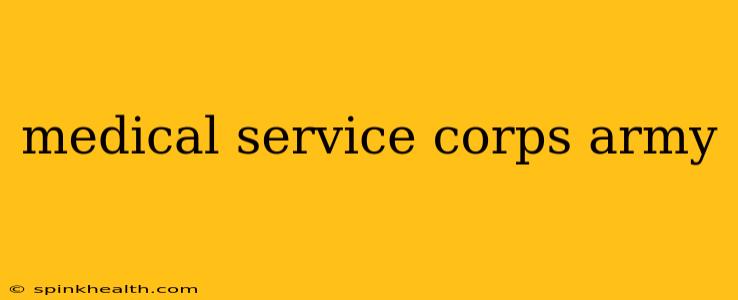The Army Medical Service Corps (MSC) isn't just a job; it's a calling. It's a pathway for driven individuals to combine their professional skills with a profound commitment to serving their country and the well-being of its soldiers. This isn't your typical military career; it's a unique blend of medical expertise and military discipline, offering a rich tapestry of challenges and rewards. Let's unravel the complexities and explore the exciting possibilities within the ranks of the Army MSC.
What Does the Army Medical Service Corps Do?
The MSC is the backbone of the Army's medical system, supporting soldiers from the front lines to the rear echelon. Think of it as the orchestra's conductor, coordinating the efforts of physicians, nurses, and other healthcare professionals to ensure the health and readiness of the force. But the MSC's role goes far beyond simply providing medical care. Its members are vital in:
- Planning and logistics: MSC officers are responsible for the strategic planning and logistical management of medical resources, ensuring the availability of vital supplies and equipment wherever and whenever needed.
- Administrative support: Beyond the clinical aspects, they handle administrative duties, overseeing medical facilities, managing personnel, and ensuring compliance with regulations.
- Specialized roles: The MSC boasts a wide range of specialized roles, from dieticians and medical planners to optometrists and veterinarians, reflecting the diverse healthcare needs of the military.
- Research and development: Many MSC officers contribute to medical research and development, advancing medical practices and technologies for both military and civilian applications.
What Are the Different Specialties Within the Army Medical Service Corps?
The Army MSC isn't a one-size-fits-all career path. Its diversity is a significant strength, allowing individuals with a broad range of medical and healthcare backgrounds to contribute their expertise. Some key specialties include:
- Medical Service Administration: These officers manage and oversee the administrative aspects of Army medical facilities and operations.
- Health Services Administration: Similar to medical service administration but often focusing on the broader healthcare system within a unit or region.
- Clinical Science: This specialty encompasses a wide range of clinical disciplines, offering opportunities for various healthcare professionals to apply their skills within a military context.
- Preventive Medicine: Officers in this specialty focus on preventing disease and promoting health within military populations, playing a crucial role in maintaining force readiness.
What Are the Requirements to Join the Army Medical Service Corps?
Joining the Army MSC requires a combination of academic achievement and personal dedication. Specific requirements vary depending on the chosen specialty, but generally include:
- A relevant degree: Applicants typically need a bachelor's or advanced degree in a related healthcare field.
- Licensure/certification: Many specialties require professional licensure or certification.
- Passing a physical examination: Applicants must meet the Army's stringent physical fitness standards.
- Background check and security clearance: A comprehensive background check and security clearance are mandatory.
What is the Training Like for the Army Medical Service Corps?
Once accepted, MSC officers undergo rigorous training, combining military instruction with specialized medical training. This training usually involves:
- Basic Officer Leadership Course (BOLC): This course instills the fundamental leadership skills necessary for leading soldiers.
- Specialized training: Depending on the chosen specialty, further training is provided to develop the necessary clinical or administrative skills.
- On-the-job training: Many MSC officers receive on-the-job training, gaining practical experience under the guidance of experienced mentors.
What Are the Career Progression Opportunities Within the Army Medical Service Corps?
The Army MSC offers a structured career progression path, with opportunities for advancement to increasingly senior leadership positions. Officers can progress through the ranks, taking on greater responsibility and leadership roles as their experience grows.
What is the Difference Between the Army Medical Service Corps and Other Army Medical Careers?
While the Army Medical Department encompasses various roles, the MSC uniquely focuses on the administrative, logistical, and specialized support roles crucial to the effective functioning of the entire medical system. Doctors and nurses serve under the MSC's organizational umbrella, receiving support and direction.
In conclusion, the Army Medical Service Corps offers a fulfilling and challenging career path for dedicated individuals who want to combine their medical expertise with the rewarding experience of serving their country. It’s a world of opportunity, leadership, and service, where you can make a tangible difference in the lives of others.

